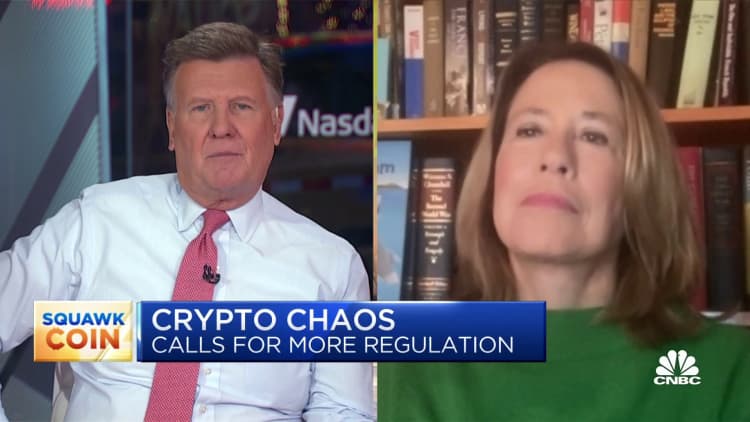The Latest Front in the Crypto Wars Is Binance-Paxos and BUSD
Paxos announced it will cease issuing BUSD after action by the NYDFS.
February 13, 2023
Crypto firm Paxos to face SEC charges, ordered to stop minting Binance stablecoin
PUBLISHED MON, FEB 13 20239:19 AM ESTUPDATED 2 HOURS AGO
Rohan Goswami @ROGOSWAMI
SHAREShare Article via FacebookShare Article via TwitterShare Article via LinkedInShare Article via Email
KEY POINTS
New York state regulators ordered Paxos to stop minting new Binance USD tokens, Binance CEO Changpeng Zhao said on Twitter.The Ethereum-built BUSD tokens are backed by some $16 billion worth of Treasurys and Treasury Reverse Repurchase Agreements.The regulator said it issued the order Monday “as a result of several unresolved issues related to Paxos’ oversight of its relationship with Binance.”
In this article
BUSD.CM=-0.0002057552337646 (-0.02%)

Chad Cascarilla, CEO of Paxos.
Adam Jeffery | CNBC
Cryptocurrency firm Paxos will cease issuing new Binance USD, or BUSD, stablecoins under the direction of New York state’s financial regulator, Binance founder Changpeng Zhao said Monday.
Paxos’ own stablecoin was not impacted, but the company did confirm it had been notified by the Securities and Exchange Commission of potential charges in connection with its BUSD product.
A stablecoin is a cryptocurrency which attempts to maintain a more stable price, usually by pegging its value to an underlying asset like gold, or in this case, U.S. dollars.
The move is the latest in an escalating regulatory effort to rein in the once free-wheeling crypto industry. Last week, the Securities and Exchange Commission settled with crypto exchange Kraken over allegations of unregistered offering and sale, in connection with Kraken’s crypto staking platform.
The New York State Department of Financial Services issued the order “as a result of several unresolved issues related to Paxos’ oversight of its relationship with Binance,” the regulator said Monday in a consumer alert.
“We were informed by Paxos they have been directed to cease minting new BUSD [Binance’s stablecoin] by the New York Department of Financial Services,” Zhao said on Twitter.
“Effective February 21, Paxos will cease issuance of new BUSD tokens as directed by and working in close coordination with the New York Department of Financial Services,” Paxos said in a statement, adding that it would “end its relationship with Binance for the branded stablecoin BUSD.”
The potential SEC charges came through what’s known as a Wells notice, which informs firms of the results of an investigation pending charges. The Wall Street Journal reported Monday that the SEC would argue that Paxos’ BUSD product was a security, an approach it has employed with other crypto firms including Gemini, Genesis, and Kraken.
“Paxos categorically disagrees with the SEC staff because BUSD is not a security under the federal securities laws,” a Paxos spokesperson told CNBC. “This SEC Wells notice pertains only to BUSD. To be clear, there are unequivocally no other allegations against Paxos.”
The spokesperson also said, “We will engage with the SEC staff on this issue and are prepared to vigorously litigate if necessary.”
Binance did not immediately respond to requests for comment.
Paxos’ BUSD product is built on the Ethereum blockchain and backed one-to-one by U.S. Treasuries and Treasury Reverse Repurchase Agreements, with Paxos reporting some $16 billion in holdings as of Jan. 31. Paxos’ BUSD product is related to, but separate from, Binance’s self-issued Binance-pegged BUSD.
Binance’s self-issued BUSD, which is not directly regulated by NYDFS, is independently wrapped and issued by the crypto exchange on blockchains beyond Ethereum. In other words, Binance can take a single Paxos-issued BUSD, create an analogous BUSD on another blockchain (like Binance’s own blockchain, for example), and freeze a corresponding Paxos-issued BUSD.
“The Department has not authorized Binance-Peg BUSD on any blockchain, and Binance-Peg BUSD is not issued by Paxos,” NYDFS said.
“This action does not impact our ability to continue serving new or existing customers, our continued dedication to grow our staff or fund our business objectives,” Paxos’ statement said.
In 2014, New York became the first state to establish licensing for crypto-related companies. Paxos is one of over two dozen companies that have secured a BitLicense. In January, NYDFS took action against another regulated company, Coinbase.
Two other New York-state regulated entities, Genesis Global Trading and crypto exchange Gemini, have been accused by the Securities and Exchange Commission of engaging in the unregistered offer and sale of securities, in connection with a joint crypto lending program.

WATCH NOW
VIDEO05:18
Blockchain holds a lot of promise, but most of it is speculative, says Fmr. FDIC Chair Sheila Bair
|






